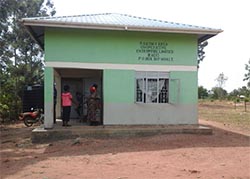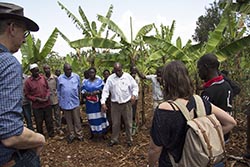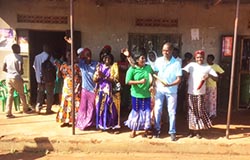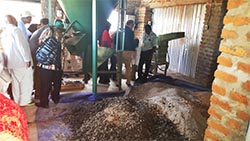This article (Podcaster 42, December 2016) was chosen by Peter Ebanyat as it shows the intended outcome of the project intervention
Thus from the article- N2Africa is a downstream action project that reaches smallholder farmers and supports them build and use appropriate linkage strategies to exploit opportunities along grain legume value chains to improve their livelihoods.
On 1st March 2017, almost 80 workshop participants attended a field learning visit for the N2Africa and TAMASA projects. The learning visit aimed to provide the participants the opportunity of learning about the project implementation progress and through reflections, establish personal and collective learning for better implementation. Moreover, having both projects participants go together on the learning visit, allowed cross learning. The N2Africa project is implemented in eight districts in eastern Uganda, and fall within mainly two contrasting agro-ecological zones of the Southern and Eastern Lake Kyoga Basin covering the low lying rolling plains and the Elgon Farmlands covering the highlands. The low lands are dominated by annual cassava-based farming systems with rice cultivated in valleys. Maize, groundnut, soyabean and to some extent bush beans are integrated in the cropping systems. The perennial coffee-banana farming systems dominate the highlands with maize and common beans being integral components of the cropping system up to the mid-altitude zone.
Project implementation in the region is led by the dissemination partner, Churches Action in Relief and Development (CARD) Uganda in partnership with farmer associations/groups and facilitates linkages to input traders and produce buyers around the focus crops, common bean, soyabean and groundnut using various models.
From Mbale, the workshop venue, four groups of participants went on a learning visit to one action site Kibuku, Bukedea and Tororo in the low lands and Kapchorwa in the highlands. The different learning visit sites provided an opportunity to learn from farming communities and partners the different models used for dissemination, and access to input and output markets. Producer-collective model is employed by cooperatives in Bukedea, Kibuku with minor differences in strategies, while the the buyer led model is used by AgriNet in Tororo. Surprisingly, these cooperatives don’t suffer the common problem of side selling as it is in some regions because of clear guidelines on bulking.
Some learnings from these visits are presentend in boxes.
The first learning visit group went to Kibuku District and interacted with the members of Kagumu Area Cooperative Enterprise (ACE) to learn about how to increase access to output marketing through bulking as well as aggregated demand for inputs as means for input access. They apply the producer-collector model and have a store for bulking produce and guidelines for bulking Farmers are mobilised into Rural Producer Organisations (RPOs) and linked to the main cooperative.
|
Field visit to Kagumu area cooperative enterprice, Kibuku District Kagumu Area Cooperative Enterprise (KACE) was established in 2009 and comprises of five Rural Peoples Organisations (RPOs) with a total membership of 600. Leadership is trained in governance and leadership skills by Uganda Cooperative Alliance. The main crops KACE is engaged in are groundnut, soyabean, maize and cassava. Services rendered to members by KACE include capacity building through demonstrations of improved technologies by N2Africa since 2014, providing access to input and output market, improving members’ access to finance, linking members to strategic partners including government and development partners, post-harvest technologies and providing bulking services with a permanent store for produce. A credit union (SACCO) was established in 2012 to offer financial assistance to members and non-members in the communities. Every ordinary member of the cooperative is obliged to sell 20% of his/her produce to the cooperative, while board and committee members have to sell 30%. Members are educated on the benefits of collective selling to reduce side selling. Farmers who are in need of immediate cash are assisted by the cooperative to enable them to store their produce. New markets are assessed by the market committee, which travels to cities and market centers to source and negotiate markets for the cooperative. The criteria used to determine profitable enterprises are food security, risk, availability of market, availability of technologies and profitability. Enhancing cohesion and confidence of members is achieved through accountability and transparency. For the latter a general meeting is organized once every year for the leadership to account for their stewardship and leaders are trained in governance and leadership skills. The cooperative works on its sustainability by the establishment of strong financial capital to make the cooperative self-financing, by the establishment of better linkages with other partners, through capacity building of its members and by putting up an input supply system. Opportunities for KACE are the management by professionally trained staff, linkage to markets, the permanent store for storage of farm produce, and the existence of the SACCO for financial services to members. Challenges are the unreliable market, low production by members to attract large buyers and limited capacity of the cooperative to bulk produce. Future Plans consist of the establishment of input supply shops, identification of potential farmers for seed production, establishing a partnership with agricultural research institutions for technology dissemination to the cooperative members, value addition to the produce and linking with more reliable markets. Samuel Adjei-Nsiah, IITA, Ghana Country Coordinator N2Africa |
The second learning visit group visited Basar Integrated Farmers’ Association in Kapchorwa. The association joined the project in 2013 growing climbing beans with 15 members and rose to 30 members. The group first embraced and popularised diversification of the production systems with newly introduced climbing bean varieties and later in 2015 mobilising other farmers to form the Association and are transitioning to a cooperative to take advantage of collecting marketing of produce but also to specifically tackle the challenge of poor quality inputs seed and fertilisers, and addressing postharvest constraints, in particular storage, pests.
|
Diversification of production systems - climbing bean production in the intensively cultivated Mt. Elgon highlands In the learning visit to Kapchorwa District, beautifully situated on the slopes of Mt Elgon in between the coffee and bananas, we visited Basari Integrated Farmers Association. This association was founded in 2011 and focused on horticultural crops, maize, bush bean and poultry. In 2013, N2Africa started working in the area and introduced the farmers to different climbing bean varieties, inputs and staking methods. Since farmers realized the new varieties and agronomic practices boosted yields compared with their locally grown variety, the association became interested in the commercial production of climbing beans. The number of members increased from 16 to 30, and the association was registered as a cooperative. Their aim is to venture into bulking and collective marketing of climbing beans. During the visit, we found out that commercial climbing bean production did not take off yet. The farmers grew the improved varieties but, faced with drought, got smaller yields than expected. And as they appreciated the taste and nutritional value of the beans, they ate whatever they harvested and did not have anything left to sell. They plan to grow climbing beans again this season, but the small yield led to a lack of seed and the farmers did not know where to buy new seed. Community-based seed multiplication is therefore a point of action in this area. In addition, the farmers who managed to store seed, saw their seed being eaten by bruchid beetles. Triple-layer, airtight bags (PICS bags) for storage of the beans will be introduced by N2Africa in the coming season. The farmers assured that with larger quantities of seed available, they would plant a larger area with climbing beans. At the same time, the cooperative lobbies for extended cultivation of climbing beans among other farmers in the area. As traders from Kenya are already looking for beans in Kapchorwa district, the farmers hope to increase production volumes and are confident that there will be a ready market to sell their produce. Esther Ronner, Wageningen University & Research, The Netherlands |
The third learning visit group visited Koena Farmer’s Cooperative in Bukedea District, which is made of up of 25 farmer groups. The producer collective model is used in by the cooperative but has emphasised value addition to increase gains from output markets, and has a sales outlet shop located in Bukeda town. They have milling machines for cassava and maize, have engaged more women and also provide milling services to the community at a fee and for maize portable threshers which can be easily moved around. This cooperative also engages in direct contract farming in production of sorghum for a beer company, Nile breweries.
|
Producer-led model (with some value addition), Koena Cooperative society, Bukedea District Koena farmers’ cooperative is one of N2Africa partners and focuses on groundnut, maize and soybean value chains. It is composed of 247 members from whom the majority are enthusiastic and energetic women. Indeed, empowering women is one goal of the cooperative. The cooperative was characterized by strong social capital. Composed by members of two religions (Muslims and Christians) speaking 3 different languages, the impression that visitors had is that members are unity towards the common goal of improving their livelihoods through cooperatives. During the field visit we learned that farmer members of the cooperative are engaged in:
Wilson Leonardo, IFDC, Country Coordinator Mozambique N2Africa (Photos: Martin van Ittersum, Wageningen University & Research, The Netherlands, TAMASA) |
The fourth learning visit group visited Agrinet a private business partner, in Tororo that employs the buyer led model with a specific quest to mobilise quality produce from the farmers. The company has since 2014 been engaged in soyabean grain from N2Africa farmers even to as far as northern region.
AgriNet a business established in 2008 is a key partner in the marketing segment of the value chain and work through a network of commission buying agents across the country they are a pulling force for increasing production and provide embedded services in especially in post-harvest handling and business skills and quality improved seed. They process maize and animal feeds with soyabean the company also conducts training in post-harvest handling and facilitates access to improved seed. They face a major challenge in developing sustainable partnerships with producer groups/associations and low volumes of produce due to dishonouring of contracts by producers. How to deal with these were subjects of interest in establishing sustainable partnerships.
|
Buyer led model for Improved Market Access of Soyabean in the Eastern Region During the learning visit to Tororo, we visited AgriNet, a business enterprise that was established in 2008 to fill a gap in the agricultural marketing chain. Their focus is to understand how markets work and being able to manage and /or cope with the market dynamics. For the past 5 years, AgriNet has offered innovative market linkage solutions and services for agribusiness value chain actors including smallholder farmers, traders, and large-scale processers and exporters. It is their ability to keep learning by doing and innovating that sets them apart and progressing. Their flagship products and service include agricultural market intelligence; transaction security service, product marketing, agro-processing and value addition. They work through a network of buying/commission agents across the country and their main activities are buying and selling of grain and processing of animal feeds with maize and soya bean at their plant in Tororo District, situated 60 km South of Mbale. AgriNet entered a strategic partnership with N2Africa dissemination partners (WVU and CARD-Uganda in 2014 to buy soyabean, and stimulate production, improve post-harvest handling and access output markets in northern and eastern Uganda. It is through this partnership that farmers are able to produce soya with a guaranteed market. And through the partnership, AgriNet has been able to buy over 200 tonnes per year even though their demand was 300 tonnes last year. These volumes were hampered by side selling on the part of farmers but also failure to honour contracts that have led to farmers selling to other buyers. Since AgriNet was established, over 4000 smallholder farmers have been linked to them for market access across the regions with over 800 direct beneficiaries from N2Africa. These farmers have received trainings in post-harvest handling, improved soyabean seed and assured market for their produce. However AgriNet still faces many challenges that include; Low volume of product from farmers which leads to underutilization of their plant, Low quality of produce, Weak relationship between farmers and AgriNet leading to lack of honouring the buyer agreements and low capital for investment. Looking into the future, AgriNet envisages being sustainable in 5 years once the farmer-buyer relationship is strengthened. Their target is to market 500 tonnes of produce from the N2Africa farmers this year 2017. Connetie Ayesiga, IITA, Business development Officer Uganda, N2Africa |
Connetie Ayesiga (Business Development Officer) and Peter Ebanyat Country Coordinator, IITA Uganda




